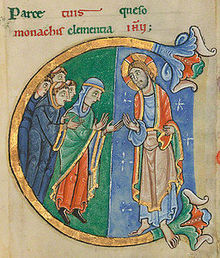| This article needs additional citations for verification. Please help improve this article by adding citations to reliable sources. Unsourced material may be challenged and removed. Find sources: "Geoffrey de Gorham" – news · newspapers · books · scholar · JSTOR (November 2018) (Learn how and when to remove this message) |

Geoffrey de Gorham (Goreham, Gorron), sometimes called Geoffrey of Dunstable or of Le Mans (died at St Albans, 26 February 1146), was a Norman scholar who became Abbot of St Albans Abbey, 1119 to 1146.
Life
Geoffrey, born in the province of Maine, then annexed to the Dukedom of Normandy, was from a noble family of Caen, Normandy. He was invited by Richard d'Aubeney, Abbot of St Albans, to become master of the Abbey school. On his arrival, he found that, owing to his journey being delayed, another had been appointed, whereupon he opened a school at Dunstable.
According to the Gesta Abbatum Monasterii Sancti Albani ("The Deeds of the Abbots of the Monastery of St Alban"), Geoffrey staged a miracle play on St. Katherine. A chronicle relates how he had borrowed some copes from St Albans Abbey for the performance, but had the misfortune to lose his books and the copes in a fire at his house in the night after the performance. To make up to God and the saint for the loss of the copes, he determined to become a monk of St Albans Abbey.
Abbot
Here he rose to be prior, and finally was elected abbot on the death of Richard, in 1119. He ruled for twenty-six years, and the abbey prospered. He built a fine guests' hall, and an infirmary with a chapel. Although he spent large sums on a new shrine of St Alban, he did not hesitate during a year of famine to remove the silver plates and use them to relieve the poor. He translated the body of the saint to the completed shrine on 2 August 1129. He also founded the hospital of St. Julian for lepers, on the London road.
During the wars of King Stephen's reign, he melted down other silver and gave it to William of Ypres, and the Earl of Arundel, as ransom for the town of St. Albans, which they threatened to burn.

Geoffrey endowed the nunnery at Sopwell. Markyate Priory, in Hertfordshire, was founded in 1145, in a wood which was then part of the parish of Caddington, and belonged to the Dean and Chapter of St Paul's Cathedral, London. The house was built under the patronage of Geoffrey, for his friend, the recluse Christina of Markyate. It has been suggested by Janet Geddes and other scholars that Geoffrey's esteem for the prioress was such that he had a psalter made as a gift for her; and in celebration of their friendship had an illuminated "C" placed at the beginning of Psalm 105.
Geoffrey de Gorham died at St Albans 26 February 1146. His nephew Robert de Gorham became the eighteenth Abbot in 1151.
References
- ^ Burton, Edwin. "Geoffrey of Dunstable." The Catholic Encyclopedia Vol. 6. New York: Robert Appleton Company, 1909. 28 August 2022
 This article incorporates text from this source, which is in the public domain.
This article incorporates text from this source, which is in the public domain.
- Richard Axton, European Drama of the Early Middle Ages (1974), p. 161.
- ^ "Geoffrey of Gorham" . Dictionary of National Biography. London: Smith, Elder & Co. 1885–1900.
- Amt, Emilie (1993). The Accession of Henry II in England: Royal Government Restored, 1149-1159. Boydell & Brewer. p. 88. ISBN 0851153488.
- British History Online: Victoria County History, Hertfordshire - A History of the County of Hertford: Volume 4: Houses of Benedictine nuns: Sopwell Priory
- Geddes, Jane. "St Alban's Psalter translation and transcription".
- Gorham, George Cornelius. Genealogical accounts of the Breton and Anglo-Breton families De Gorram, in the Maine, Hertfordshire, Leicestershire and Northamptonshire, during the 12th, 13th, and 14th centuries., vol 1, J.B. Nichols and Son, 1837, p. 18
- Attribution
 This article incorporates text from a publication now in the public domain: Herbermann, Charles, ed. (1913). "Geoffrey of Dunstable". Catholic Encyclopedia. New York: Robert Appleton Company.
This article incorporates text from a publication now in the public domain: Herbermann, Charles, ed. (1913). "Geoffrey of Dunstable". Catholic Encyclopedia. New York: Robert Appleton Company.- "Geoffrey of Gorham" . Dictionary of National Biography. London: Smith, Elder & Co. 1885–1900.